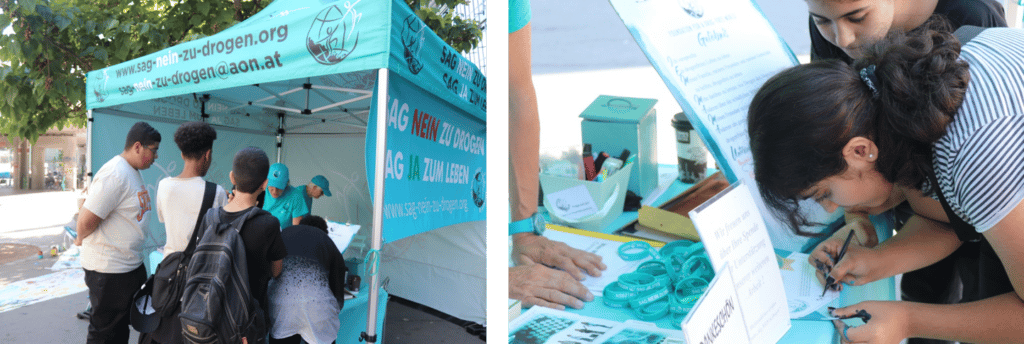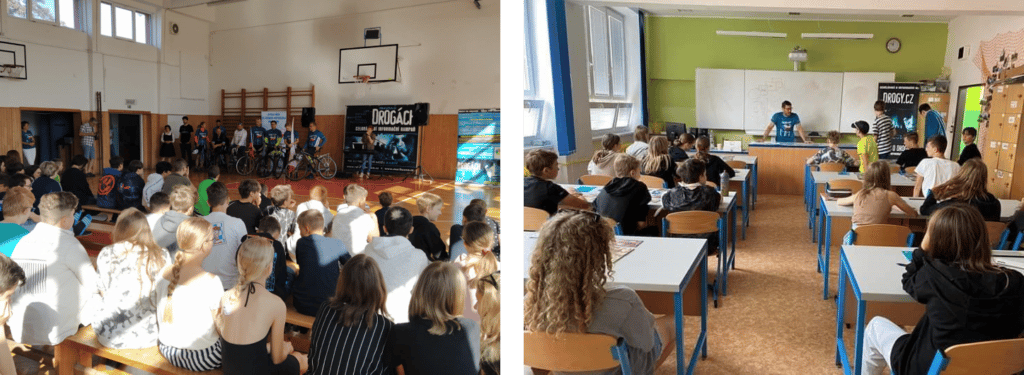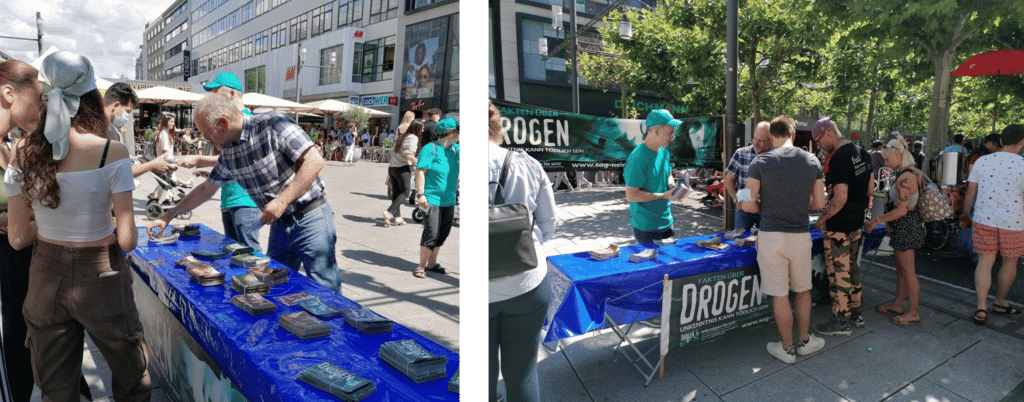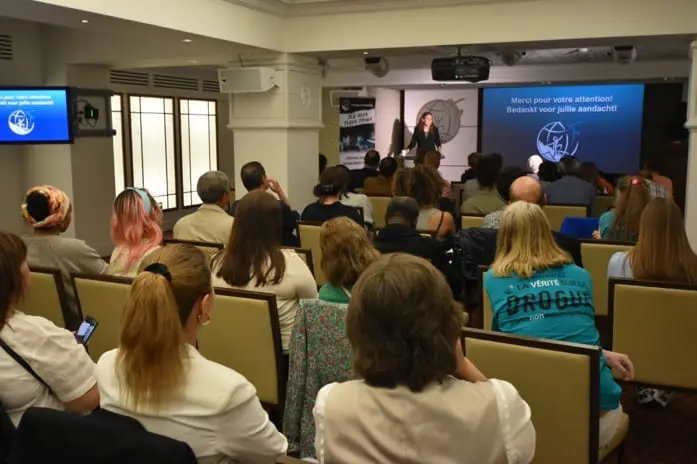The United Nations General Assembly by the Resolution 42/112 of 7 December 1987 decided to celebrate the 26 June, the International Day against Drug Abuse and Illicit Trafficking, “as an expression of its determination to strengthen action and cooperation to achieve the goal of an international society free of drug abuse.
“Supported each year by individuals, communities, and various organizations all over the world, this global observance aims to raise awareness of the major problem that illicit drugs represent to society.”
The Foundation for a Drug-Free Europe since 2004 is channelling the views of a hundred Say No To Drugs (SNTD) organizations and groups of volunteers across Europe (including in Ukraine, the United Kingdom and Ireland) whose purpose is to inform, to educate the public at large including the most vulnerable: the youth, on the harming effects of drug use. Indeed, despite what is spread by any organizations with vested interests in the business of drugs, there are no soft drugs. And this is very clear on the materials all these groups used, known as “The Truth About Drugs” campaign.
It is important to remind that legally speaking, the drug’s availability is strictly regulated by the International Drug Control Conventions (1961, 1971, 1988) and the Charter of Fundamental Rights of the European Union (2000/C 364/01) – Directive (EU) 2017/2103, to protect the population and prevent their illicit use. More specifically, the protection of the youth is provided by the European Charter of the Rights of the Child – Recommendation 874 (1979) and the Convention on the Rights of the Child, art.33, 1989.
But the data and legislations hardly reach the grassroots level despite the increasing efforts of the concerned institutions. Through contacts with the public, teachers, associations leaders or trainers at random from their booths/tents set up in the streets, markets, and squares and by visiting shops, the SNTD teams are witnessing a striking lack of education on this vital subject, thus leaving the way open for these highly organized and powerful networks of drug dealers. So, to contribute to raising the awareness of the public, educators, community leaders and officials, the SNTD Teams are distributing freely educative booklets on the 14 most used drugs and other video educative materials provided by the Foundation for a Drug-Free World in 17 languages. “Education is the progressive discovery of our own ignorance” rightly said the philosopher William Durant ( 1885-1981).
All the SNTD volunteers from Europe are very interested and concerned with this day celebration, enabling them to meet and inform the public and the youth and get them involved to take responsibility to protect themselves but also their family and friends from the harmful effects of drug use.
But drug use is not just harming. Ultimately and rapidly, due to the addictive psychoactive components, drug abuse is leading to the destruction of the user and more. The European Monitoring Centre for Drugs and Drug Addiction (EMCDDA) recently reported that “drug-related mortality accounts for a considerable percentage of deaths among young people in many European countries”. According to the last estimation (31 August 2021) “at least 5,141 overdose deaths occurred in the European Union in 2019. This rises to an estimated 5,769 deaths if Norway and Turkey are included”. A dreadful ignorance!
Hereafter are some examples from Europe of SNTD Teams in action in the frame of the 26 June Celebration:
1) Austria

In Vienna, they held their tent at the Millennium City, a train station and shopping center, near the Donauinsel (Danube Island). The 8 volunteers distributed 800 booklets and collected 40 signatures on the board with the pledge to Stay Drug-free. In addition, they had their successful street paintings for the children and significant contacts were made with associations and educators for further lectures on drugs.
2) Belgium

The team organized in Brussels an Open House on the drug subject followed by a 1h30 seminar in Dutch and French. More than 50 people were attending, very interested to get factual data on drugs. Then, they took: 22 booklet sets (a set containing 14 different booklets on the most used drugs), 9 info kits and 6 DVDs (with testimonies and short presentations) in French; 7 booklet sets, 5 info kits and 5 DVD’s in Dutch; 8 booklet sets and 5 info kits in English.
3) Czech Republic

This year was their 18th Cyclo-run, starting on 13 June for 10 days, covering some 1200 Kms and crossing 41 towns. Along the way, the “bikers and runners” met with town representatives, and community leaders did to say the less, lectures in 30 schools to more than 4,500 children, distributed 10,000 fliers and 35,000 booklets to the public, got 5 TV reports, several radios and newspapers, raising the awareness on the untold harming effects of drug use and spreading the message on the importance of a drug-free life.
4) Denmark

A Team of some 10 persons were mobilized to hold info stands in front of the main train station of Copenhagen. This way 2,300 booklets from the series The Truth About Drugs and 200 fliers got distributed to the passers-by. This was also a good opportunity to answer questions on drugs and to get in relation with people interested in a follow-up on the drug subject.
5) France

Along the week some 4,261 booklets were hand-distributed and 160 shops were visited in cities and villages across France such as in Paris (with a singer) and suburbs, Lyon, Pau, Nice, Angers, Auray, Clermont-Ferrand, Riom, Erquy, Cahors and in Marseille who in addition got in 1,5 hrs some 272 signatures on their pledges: An Engagement to Stay Drug-Free.
6) Germany

The info stand was in the middle of the main walking street of Frankfurt for about 2,5 hours with 6 helpers. Among the visitors, they had a teacher interested in his school, ladies from the Techno-Scene for a lecture, and a group of 5 girls (around 13 years old) who took booklets for their friends. One came back half an hour later to take more booklets with her for more friends! 825 booklets were distributed and fruitful contacts were made.
7) Greece

They were 15 Volunteers from the Athens team who distributed 2,500 booklets during 1,5hrs in the Piraeus harbour area and also to some shops around. The motto: “Inform people before dealers do”. Adolescents, adults and young parents, all were interested to have more data on drugs and were happy to get these informative booklets for them and their friends. Many pertinent questions were answered to full satisfaction.
The FDFE and all the European SNTD volunteers are very concerned about the protection of the youth from the deleterious effects of drug use. The old saying “Prevention is Better than Cure” has a much greater implication than it seems: it encompasses not only the individual but the family circle and has a great incidence on the community and social living. Aligned with the purpose of the 26 June celebration, let us remember these words of the humanist Ron Hubbard (1911-1986): “The drug scene is planet-wide and swimming in blood and human misery. Research demonstrates that the single most destructive element present in our current culture is drugs.”
The drug problem is not a fatality. To curtail the drug demand an early education of the children as primary prevention, good parental examples, and the support of youth associations, community and authorities are the efficient tools. Indeed, as the old African proverb says: “It takes a whole village to educate a child”. This is the safe and sane way “to achieve the goal of an international society free of drug abuse”.







